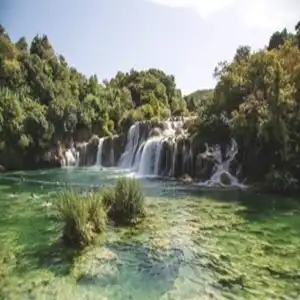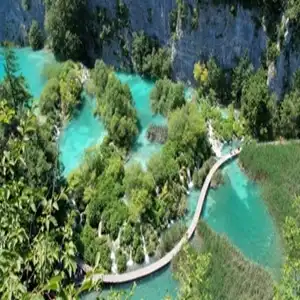🇭🇷 Croatia
Croatia, officially the Republic of Croatia, is a Southern European country bordering Slovenia to the northwest, Hungary to the northeast, Serbia to the east, Bosnia and Herzegovina 1 and Montenegro to the southeast, and the Adriatic Sea to the west. Zagreb, the capital and largest city, serves as the administrative center of the country, which is divided into 21 counties. Croatia covers an area of 56,594 square kilometers and has a population of approximately 4.28 million, with a majority Roman Catholic population. Human presence in Croatia dates back to the Paleolithic era. Croats settled in the region in the 6th century, and by the 9th century, the area had evolved into two duchies.
Population: 3.8 million
Capital: Zagreb
Zagreb overview: Zagreb offers Upper Town history, museums, cafes, and Central European charm.
🔗 For more on Zagreb click here
Population (approx. 2025): 800,000
Primary cities:
🔗 Split.
🔗 Rijeka.
🔗 Osijek.
🔗 Zadar.
🔗 Slavonski Brod.
✅ Plan your trip in one click: overview, currency, language, itinerary, attractions, hotels, cuisine, transport, weather & PDF export.
🔗 Website: 🇭🇷 Croatia Tourism

💧 Krka National Park waterfalls and nature reserve
Krka National Park is one of the national parks of Croatia, the name of the current Krka that it encases. It is situated along the center lower course of the Krka River in focal Dalmatia, in ibenik-Knin district, downstream Miljevci region, and only a couple of kilometers upper east of the city of ibenik. It was shaped to secure the Krka River and is planned essentially for logical, social, instructive, recreational, and the travel industry exercises. It is the seventh national park in Croatia and was broadcasted as national park in 1985. The Krka National Park has a place with the Southern European area. Because of its extraordinary position and the mosaic appropriation of different sorts of living spaces, it is portrayed by especially rich and shifted widely varied vegetation.
Address: Lozovac, Croatia
Visiting Hours: 08.00 am to 08.00 pm - Roski Slap 09.00am to 8.00 pm
Entry Fees: During High Season 150 Kunas (20 Euros) During Middle Season 110 Kunas During Winter (November to March) 30 Kunas
Phone: +385 22 201 777
🔗 Website: Official Krka National Park
⛪ Euphrasian Basilica UNESCO heritage church
Euphrasian Basilica and the Cathedral of the Assumption is a Roman Catholic basilica in the Istrian town Porec, Croatia. The episcopal complex, which involves the basilica itself, a sacristy, a baptistery and the chime tower of the close by diocese supervisor's castle, is an astounding case of early Byzantine design in the Mediterranean locale. The Euphrasian basilica has generally held its unique shape, however mishaps, flames and tremors have modified a couple of subtleties. Since it is the third church to be based on a similar site, it hides past structures, for instance the incredible floor mosaic of the past basilica from the fifth century. Given the remarkable worth, it is enlisted in the UNESCO World Heritage List since 1997. The basilica is the church of the Catholic Diocese of Porec-Pula.
🔗
Website: Official Euphrasian Basilica Poreč (UNESCO)

🌊 Plitvice Lakes National Park scenic waterfalls
Plitvice Lakes National Park is one of the most willing and most remarkable national stoppages in Croatia. In 1979, the National Park Plitvice Lakes has been added to the register of UNESCO World Heritage. The national park was developed in 1949 and is in high karst focal Croatia, bordering Bosnia and Herzegovina. The critical north south road that experiences the national park, an area interfaces the Croatian inland with the Adriatic Sea shore front locale. The guaranteed district connects over 296.85 square kilometres. About 90% of this region is a bit of Lika-Senj County, while the remaining 10% is a bit of Karlovac County. The national park is world-acclaimed for its lakes coordinated in falls. Sixteen lakes can be seen from the surface. These lakes are a delayed consequence of the point of a couple of little conduits and underground karst streams.
Address: Croatia
Visiting Hours: 08.00 am to 04.00 pm
Entry Fees: Jan,Feb,March and Nov, Dec 80 HRK (10.8 Euro or 11.85 US$) May and Oct 180 HRK (24.15 Euro or 26.5 US$) Jun,Jul,Aug,Sep 300 HRK (40 Euro or 44.5 US$)
Phone: +385 53 751 015
🔗 Website: Official Plitvice Lakes National Park
🏝️ Mljet island national park Adriatic nature
Mljet is the southernmost and easternmost of the major islands of the Adriatic region of Dalmatia. The National Park fuses the western bit of the island, Veliko jezero, Malo jezero, Soline Bay and a seat strap of 500 m wide from the most obvious cape of Mljet covering a zone of 54 km2.The focal pieces of the recreation center are Veliko jezero with the Isle of St. Mary, Malo jezero and the towns of Govedari, Polace and Pomena. Mljet around nine Fifty inferred by the Byzantine Emperor Constantine VII in Porphyrogenitos to run the area as one of the islands is claimed by Pagania. The island was frequently a discussion of proprietorship among them and Zachlumia until the more grounded unifications of the Serbian domain in the twelfth century. Antiquated Greeks called the island "Melita" or "nectar" which throughout the hundreds of years developed to turn into the Slavic name, Mljet.
🔗
Website: Official Mljet National Park
🏖️ Zlatni Rat Beach famous Croatian pebble beach
The Zlatni Rat, frequently alluded to as the Golden Cape or Golden Horn, is a spit of land situated around 2 kilometers (1 mile) west from the harbor town of Bol on the southern bank of the Croatian island of Brac, in the district of Dalmatia. It widens southward into the Hvar Channel, a conduit in the Adriatic Sea between the islands of Brac and Hvar, which is home to strong streams. The landform itself is generally made from a white stone beach, the remaining land is with a Mediterranean pine backwoods.
🔗
Website: Official Zlatni Rat Beach Brac
🏛️ Diocletians Palace ancient Roman UNESCO site
Diocletian's Palace is an older majestic residence worked for the Roman head Diocletian at the turn of the fourth century AD, which today outlines about a huge bit of the old town of Split, Croatia. While it is alluded to as a "castle" on account of its proposed use as the retirement living arrangement of Diocletian, the term can be deceiving as the structure is enormous and more looks like a huge fortification: about portion of it was for Diocletian's own utilization, and the rest housed the military battalion.
Visiting Hours: 24 Hours
Entry Fees: 15 Kn (around 2 euro) For Bell Tower 15 Kn For Baptistery 10 KN (1.5 euro) Basement of Palace 40 kuna (5.5 euro)
Phone: +385 97 779 0719
🔗 Website: Official Diocletian’s Palace Split (UNESCO)
🏟️ Pula Arena Roman amphitheatre historic landmark
The Pula Arena is the name of the amphitheater situated in Pula, Croatia. The Arena is the main staying Roman amphitheater to have four side towers and with every one of the three Roman compositional requests altogether safeguarded. It was developed in 27 BC - 68 AD and is among the world's six biggest enduring Roman fields. An uncommon model among the 200 enduring Roman amphitheaters, it is additionally the best-saved antiquated landmark in Croatia; be that as it may, the field isn't recorded on UNESCO world legacy list.
🔗
Website: Official Pula Arena
⛪ Cathedral of St. James UNESCO medieval cathedral
The cathedral of Saint-Jacques in Sibenik, Croatia is a basilica with three naves and three apses and a dome (32 m high inside) in the city of Sibenik, Croatia. It is the gathering of the Catholic Church in Croatia and see the enclosure Sibenik. It is additionally the most significant engineering landmark of the Renaissance in the whole nation. Since 2000, the Cathedral has been on the UNESCO World Heritage List. It is regularly known as "St Jacob's", on the grounds that Croatian, in the same way as other different dialects, utilizes a similar name for both "James" and "Jacob". It is devoted to Saint James the Greater.
🔗
Website: Official Cathedral of St. James Šibenik (UNESCO)
🏖️ Nugal Beach secluded Makarska coast beach
Nugal Beach is a coastline that is located on the Makarska Riviera in Croatia, between the towns of Makarska and Tucepi. Arranged in a pebbled sound encompassed by soak precipices, the seashore is just open by foot following a readied yet stony way along the coast from Makarska (a 30-minute walk) or from Tucepi. In 2019, Europe recorded Nugal Beach as probably the best seashores in Europe.
🔗
Website: Official Nugal Beach Makarska
⛪ Cathedral of St. Lawrence historic Romanesque church
The Cathedral of St. Lawrence is a Roman Catholic triple-naved basilica built in Romanesque Gothic in Trogir, Croatia. Since its development kept going for a few centuries, it delineates all the styles that succeeded each other in Dalmatia. It serves now as the most impressive landmark in the city of Trogir. It was based on the establishments of an Early Christian house of prayer devastated in the twelfth century during the sack of the town by the Saracens in 1123. The structure of the house of God started in 1213 and wrapped up by the seventeenth century. Like the more seasoned one, it is likewise devoted to St. Lawrence however it is otherwise called St. John's Cathedral after religious administrator John, who kicked the bucket in 1111 and stood apart for his pious way of life when the Hungarian King Koloman had assumed control over Dalmatia and Croatia.
🔗
Website: Official Cathedral of St. Lawrence Trogir (UNESCO)
Useful Information
Language:
Czech, Engligh is understood to some extent